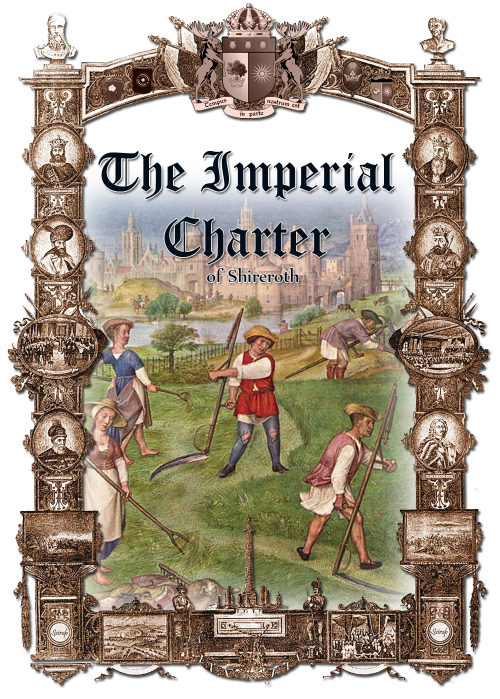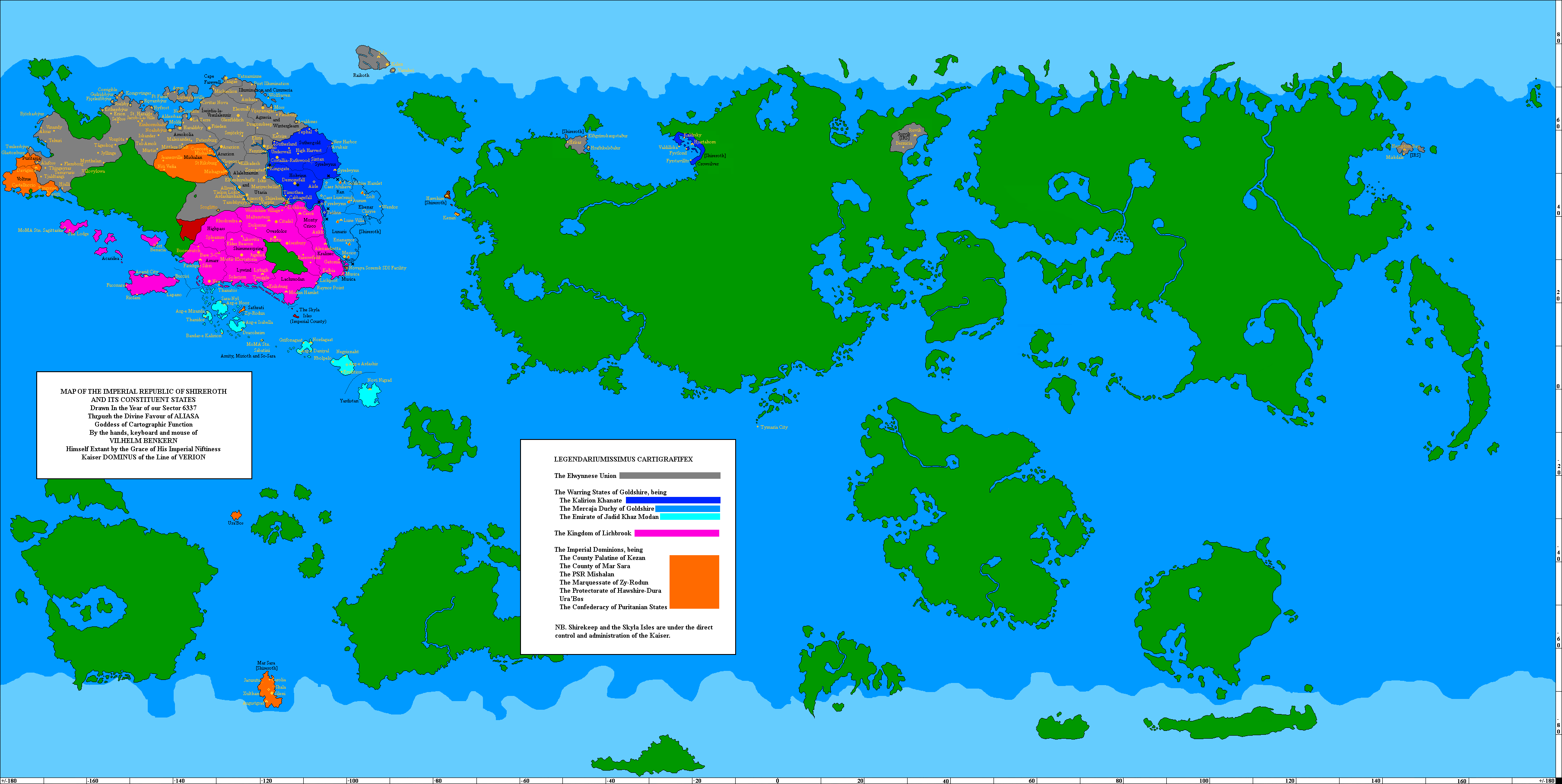Talk:History of Shireroth
Heretical Text 1
First & Second Era
Although Shireroth's fictional histories describe a First Era and Second Era of rule by legendary Kaisers, Shireroth was in fact founded on April 24, 2000, by Erik Mortis as the Republic of Shireroth. In its original incarnation, it was a direct democracy, but this lasted only a few weeks before the country was absorbed into first Audentior, then Jasonia, and finally the Union of Apollo States.
Third Era

After the last of these broke apart, Shireroth reasserted its independence in the Third Era of Kaiserial rule. Erik Mortis, once again in charge, changed the government to an absolute monarchy under Kaiser Gaelen II, and created a small feudal system with two Duchies, Brookshire and Goldshire. Shireroth soon became much more important than its youth would indicate as Patrick Foley chosed to bequeath the remnants of the UAS to it as the Duchy of Kildare. With a number of military-oriented types like Daniel K and Greg Russell, Shireroth even menaced the largest power of the time, the Flying Islands of Jasonia. However, due to real life issues, Kaiser Metzler I disappeared for a while, and Shireroth disappeared with it.
When Erik returned, he pulled the newly revived Shireroth into the Benacian Commonwealth with Hyperborea and Machiavellia. This soon led to the merge that became the Hegemony of Alexandros and later Tymaria, tying up Shireroth in larger nations until 2002.
When Shireroth reappeared after the Tymarian secessions of July 2002, it had managed to gobble up several smaller Tymarian states and gained the territories of Hyperborea, Yardistan, Jaris, and Akerbjorn, among many others. The feudal system expanded vastly to include a new level, Baron, and the Landsraad became a major organ of government.
Over the next two and a half years, Shireroth managed to dispel its image as being less serious and take its place alongside Babkha and Attera as one of the world's leading micronations. Through a series of diplomatic victories like the Mango-Camel Pact with Babkha, it gained a strong position in the international community despite a continued isolationist bent when nothing is going on that directly affects it. It also continued gaining citizens and territory, so much so that the MCS had to write a rule that Shireroth could never gain any more land.
By 2003, Shireroth's post-Tymaria glory days were gone, and many observers thought it was being outcompeted by flashier micronations like Menelmacar. In response, Steward Nikkolo declared "Oustfest", a tradition of kicking out anyone with more than three citizenships as insufficiently loyal. The tactic worked, with a smaller, sleeker core of patriotic citizens more willing to place Shirerithian interests first, and became a yearly occurence. Around the same time, the unpopular Kaiser Mog I was overthrown by Kaiser Letifer I, creating a Shirerithian tradition of revolting at the drop of a hat.
The next few years saw many highlights, including the War of the Wylthean Succession, an ultimately failed pro-democracy movement by rebel Philip Locke, and the reduction of and combination of the country's many Duchies into six "classic" ones: Brookshire, Goldshire, Elwynn, Kildare, Yardistan, and Straylight. This era ended when Kaiser Yarad I attempted the brave but ultimately doomed "New Feudalism" experiment, in which the country's traditional feudal structure was turned on its head to allow more independence and bargaining between counties. Around the same time, many of Shireroth's traditional enemies allied into a "Grand Commonwealth" designed to check Shirerithian power; due to poor communication between the government's many ministries and branches, Shireroth's response was lackluster at best. For a combination of reasons including the new feudalism, a series of weak Kaisers, foreign stagnation, and bad luck, many Shirerithians departed and by 2007 the country was in a state of complete disrepair.
Fourth Era
In October 2007, Jonas (illegally) seized the Throne as Mahamantot I to restore order in the Shirerithian lands. However, Erik Mortis returned and took the royal name Kaiser Mors V (which was seen as the beginning of the Fourth Era), and along with Ari Rahikkala led the "Great Consolidation", a reconstruction of Shireroth's institutions that shook off the inactivity of the past year. After Mortis' abdication, a long civil struggle began between a faction based in Shireroth's ally Babkha and a second faction that wanted to see ex-Cyberian Jacobus Loki on the throne. The early dominance of the Babkhan faction collapsed when it was revealed to be a front for a Babkhan plot to take over the country, and Jacobus took the throne as Kaiser Loki the Long-Awaited in 2008.
Through 2009, Shireroth gradually collected new citizens, repaired its relationship with Babkha, gained international prestige as the home of the Small Commonwealth, and otherwise enjoyed growing prestige and power abroad completely unmarred by a series of constant low-grade feudal struggles at home.
Most recently, long-standing debates between traditionalists, semi-traditionalists and liberal views resurfaced in battles over Shireroth's beloved but graphically questionable flag during Kaiser Leto III's reign and in Kaiser Agni I's controversial disbanding of the Duchies in favor of a system of noble houses. These two arguments created an era of bad feelings that led to several Shirerithians "ragequitting", especially during the short but exciting reign of Kaiseress Anandja II. Her successor, Kaiser Ikol II, declared an "Age of Tranquility" in which he hoped to resolve some of these bad feelings but failed in doing so.
Kildare stayed active during the House System as a House and was in a constant and bitter debate with the national government over the lost counties (which had come under Imperial control).
Fifth Era
The discontent over the House System and the disbandment of Duchies ultimately led to a secession of Elwynn and Straylight in August / September 2010. At that time, there was also an operation (called Operation Interdict) going on from anti-Shirerithians to make Shireroth a miserable place and get the key players (Erik Mortis, Ari Rahikkala and Scott Alexander) leave the nation. This plan partially succeeded as a lot of the citizenry left or became inactive over a quite short period of time. However, the reigns of Kaiser Ometeotl I and Fish XII led to a slow recovery and, most importantly, to the restoration of the Duchies. The Landsraad was also opened for minor nobles at that time, and the rebirth of national spirit was termed the Fifth Era of Shirerithian history.
Kildare, at that time the only active subdivision, remained loyal to the Crown despite its constant complains about the House System, which was ironic in view of subsequent events.
The secession had however dispelled the aura of invincibility that had once cloaked the office of Kaiser and called into question the very idea of Shirerithian 'nationhood' which had long bonded its many peoples in ways that government could not. Loyalty to the Kaisers would, over time, be undermined and visibly diminished by a rising patchwork of regional identities, many of which esteemed their own homespun cultural heritage more highly than they did the Imperial purple. It was a problem that would only grow worse with time.
Shaken by the impotence of the Kaisership in maintaining the facade of political unity, the political current in Shireroth moved gently in favour of democratisation with the Shirerithian legislature, the Landsraad, ending its ancient nobles-only rule and opening membership to the entire citizenry in September 2010.
Meanwhile Elwynn, in alliance with Babkha, rose, for a brief time, to even greater heights of power and glory than Shireroth attained. It annexed Amokolia to its west and formed a globe spanning colonial empire following, not unintentionally, the self-same Alexander Doctrine of the Imperial Republic it had rebelled against. So powerful did it become that there were even those, including Scott Alexander, amusingly enough, who contemplated and privately advocated capitulation to the Prince of Elwynn. However this was not to be. The reason being that independent Elwynn's greatest failing, one stemming directly from its core paradox of being a liberal imperial power, was its openness to foreigners. In particular the Elwynnese failed to maintain a proper scrutiny of the dual citizens from the Imperial Republic for whom instead the door was held open even when Eliria, the Elwynnese capital, was locked in bitter strife with Shirekeep. So it was no surprise then that the Shirerithians marshalled their expatriate vote in Elwynn to support serial usurper Jacobus Loki in rigged elections for the office of Prince. With his victory, and with the failure of the liberal elite in Elwynn to support the measures necessary to purge the fifth columnists from the body politic, Elwynn collapsed ignominiously - and after a few months of Loki's catastrophically inept misrule opted for reunification with Shireroth.
Proving once and for all that any nation that accepts inward mass migration from hostile foreign communities, that do not embrace the values of their host nation but instead remain loyal to their ancestral lands and faith, will invariably sign their own death-warrant once the demographic balance tips away from the indigenous population.
In such a fashion was the fall of Elwynn accomplished.
Opinion also moved toward insulating the provinces from the worst failures of Imperial policy by granting them substantial autonomy, in order to restore a sense of trust and wellbeing that would, in turn, keep Shireroth together. This culminated in the Lich Charter of December 2012, promulgated by Kaiseress Mira Raynora Major, wherein Shireroth's territories were transformed into a series of autonomous Imperial States with profuse powers to determine their own affairs. This stabilisation of the political and constitutional situation, among other things, contributed greatly to the peaceable reunification of Elwynn with Shireroth in April 2013, which was carried off remarkably smoothly to the extent that many of Elwynn's old hands returned to contribute to the state's brief moment of notoriety as the Coordinated State, a thought-form experiment in liberal totalitarianism.
Sixth Era
Unfortunately the Imperial State system depended on a certain level of good faith on the part of the Imperial States toward the Kaiser's government in Shirekeep, as those bonds which were no longer maintained by the Kaiser's power came to depend on the voluntary co-operation of the Imperial States with each other and with the Kaiser. The inability of the Kaiser to deal with the excessive self-interest of Imperial States was explosively demonstrated with the surprise secession of Kildare in October 2014. What Elwynn began in demoting the vaunted myth of the Shirerithian Kaisership, Kildare all but finished.
